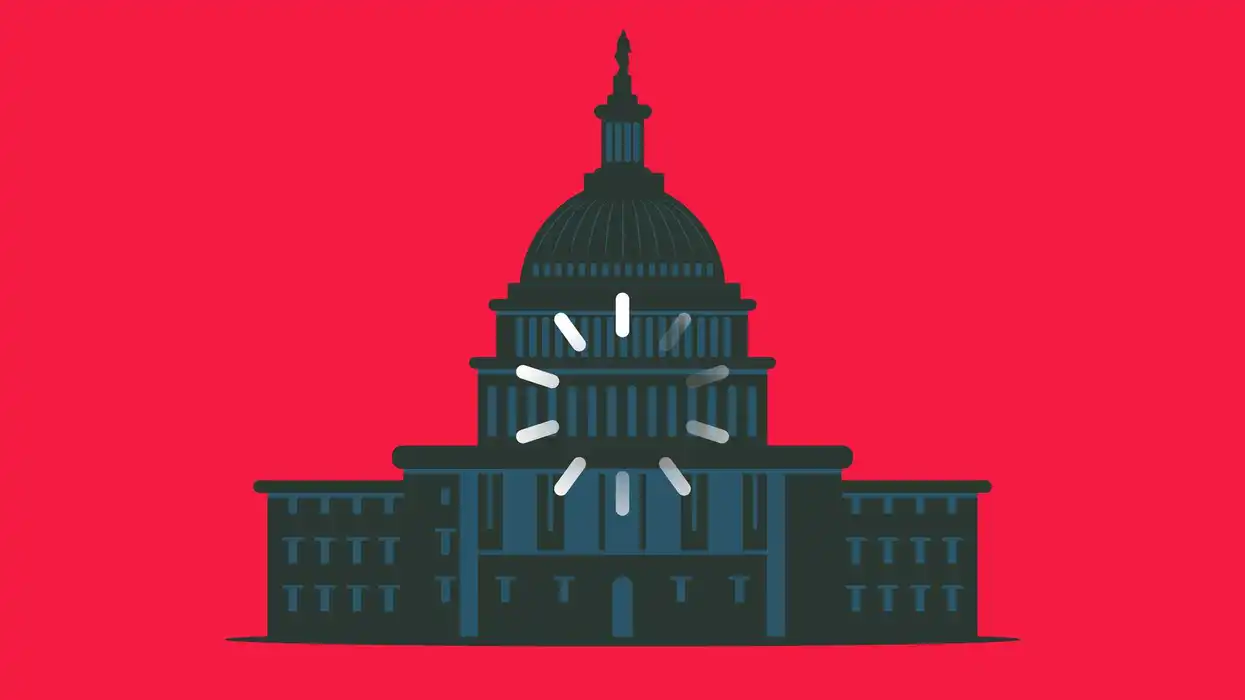In just mere weeks, we'll welcome our baby daughter into the world. Somewhere between the flurry of nurses, doctors, anesthesiologists, and specialists, there will be a stern looking man with a stamp in his hand.
As the doctors are done cleaning her up and just before they hand her to me, the stern looking man will stamp her little diaper in bright red permanent ink: “Property of the Federal Government.“
Ok, ok—so it's a ridiculous example.
There will be no stern looking man; no ominous red stamp.
The sad thing is, we’ve got leaders in some of the highest offices in the country who think this level of cradle-to-grave intervention in the lives of our children is a necessary consideration.
Enter Education Secretary Arne Duncan.
“One idea that I threw out … is this idea of public boarding schools. That’s a little bit of a different idea, a controversial idea. But the question is—do we have some children where there’s not a mom, there’s not a dad, there’s not a grandma, there’s just nobody at home? There’s just certain kids we should have 24/7 to really create a safe environment and give them a chance to be successful.”
In other words, remove certain children from any remnant of a family unit all together, and turn him/her over to be raised by the government.
Secretary Duncan certainly isn’t alone.
As The Federalist’s Joy Pullman recently noted, the concept is taking root in states like New York and Wisconsin, where the push for “full time” and “boarding school” scenarios are being discussed as legitimate responses to society’s family unit problems.
Pullman aptly described these full service schools as a “euphemism for ‘take over basically every salient aspect of parenting.’“
You know, there’s a reason why we don’t want orphaned kids to stay permanently in orphanages. After all—if the government could do a better job raising children than a family—why bother finding them homes? The fact is that children need a stable family home.
To Duncan’s point, he’s not necessarily talking about orphaned children; at least it would seem he’s talking about kids in a rough situation. Maybe dad’s not around; maybe mom works three jobs; maybe grandma is trying to raise her irresponsible, thoughtless daughter’s multiple children.
 This March 14, 2014 file photo shows Education Secretary Arne Duncan speaking in the Brady Press Briefing Room of the White House in Washington. AP Photo/Manuel Balce Ceneta, File
This March 14, 2014 file photo shows Education Secretary Arne Duncan speaking in the Brady Press Briefing Room of the White House in Washington. AP Photo/Manuel Balce Ceneta, File
And this, in Duncan’s mind, is the solution.
Do we have a broken family problem in the United States? Yes, and it’s growing.
Do we have an increasingly unstable youth population in this country? Yes.
So, is a government-run “family unit” the answer?
Let’s break this down.
The Commonsense Concerns
I want to challenge you for a moment. Set all political opinions aside, and just consider your own personal experiences. Can you—in all honesty—name a government entity at virtually any level that operates efficiently?
From the Department of Motor Vehicles to the United States Immigration and Naturalization Services, there’s certainly no shortage in inefficient operations.
Consider just a few examples.
USA Today once pointed out that “it takes 10 different offices at the Department of Health and Human Services to run programs addressing AIDS in minority communities. Autism research is spread out over 11 different agencies. Eight agencies at the Defense Department are looking for prisoners of war and missing in action. And Schriever Air Force Base in Colorado has eight different satellite control centers to control 10 satellite programs.”
In its most recent report, the Government Accountability Office “identified 12 new areas of fragmentation, overlap, and duplication in federal programs and activities. “ (emphasis mine)
Our nation’s veterans are dying waiting for the care promised them through the Veterans Affairs, and despite the Obama administration’s adamant promises to rectify the situation, the problem remains largely unresolved.
Consider also the epic failure that was just the launch of the Affordable Care Act.
 In this photo taken on Tuesday, March 25, 2013, Mrs. Mary Natali goes over some information on the dry-erase board with her first grade class at George Buck Elementary School in Indianapolis. (AP Photo/AJ Mast)
In this photo taken on Tuesday, March 25, 2013, Mrs. Mary Natali goes over some information on the dry-erase board with her first grade class at George Buck Elementary School in Indianapolis. (AP Photo/AJ Mast)
Specific to this discussion, our academic standing in the world is abysmal, especially given the fact that we’ve long held (though are slowly but surely losing) the position of preeminent super power in the world. Yet the school systems we spend myriad dollars place us, as Pew Research put it, “around the middle of the pack in international comparisons, and behind many other advanced industrial nations.
And yet despite this, the bright idea isn’t to get government out of the way of better solutions, but to create bigger, broader, farther-reaching programs—like full time schools.
The Deeper Implications
“. . . And what’s happened in our economy is that those who are doing better and better -- more skilled, more educated, luckier, having greater advantages-- are withdrawing from sort of the commons -- kids start going to private schools; kids start working out at private clubs instead of the public parks. An anti-government ideology then disinvests from those common goods and those things that draw us together. And that, in part, contributes to the fact that there’s less opportunity for our kids, all of our kids.” –President Barack Obama in remarks given at Georgetown University
We can talk all day about how our test scores stink, our inner city schools are failing, and how our education dollars are going down the drain.
But I want you to consider the deeper ideological underpinnings of an idea like Duncan’s, especially given that the man for whom he works seems to think that private school is partially behind the poverty and inequality problems he believes exist.
So here’s the bigger question: do we need to consider that maybe this goes beyond wanting to purportedly help children in a tough spot?
After all, the president himself believes that private school fosters a sort of mentality that isn’t exactly “simpatico” with the ideology of big government. He’s been quite vocal about his feeling that those who disagree with him politically are second-class citizens.
Consider also that a woman who wants to be the next president of the United States made no bones about the fact that she thinks some of us will have to change our “deep-seated cultural codes, religious beliefs and structural biases.”
So, what happens when parents like my husband and I choose to teach our daughter that our world was created in seven days (something some call child abuse); that marriage is between a man and a woman (a belief now viewed as hateful); that small government is an ideal government (a sentiment that is now compared to radicalism)?
Would someone like Arne Duncan consider us to be parents who aren’t “around” for their child?
It seems implausible. But then again, I’d wager that’s how most government overreaches start out.
Instead of talking about the growing fragmentation of families in this country, and rather than addressing the fact that our economy is stagnate (which, crazy enough, has a rather large impact on poverty levels in this country), we’re talking about making government and its so-called solutions even bigger.
Answer me this: why is the default to assume that we need MORE government? And since government is wildly successful at demonstrating that its solutions hardly ever solve the problems it purports to resolve—what is the push really about?
It’s certainly something to ponder.
Mary Ramirez is a full-time writer, creator of www.afuturefree.com (a political commentary blog), and contributor to The Chris Salcedo Show (TheBlaze Radio Network, Saturday, from noon to 3 p.m. ET). She can be reached at: afuturefree@aol.com; or on Twitter: @AFutureFree
–
TheBlaze contributor channel supports an open discourse on a range of views. The opinions expressed in this channel are solely those of each individual author.


 This March 14, 2014 file photo shows Education Secretary Arne Duncan speaking in the Brady Press Briefing Room of the White House in Washington. AP Photo/Manuel Balce Ceneta, File
This March 14, 2014 file photo shows Education Secretary Arne Duncan speaking in the Brady Press Briefing Room of the White House in Washington. AP Photo/Manuel Balce Ceneta, File






